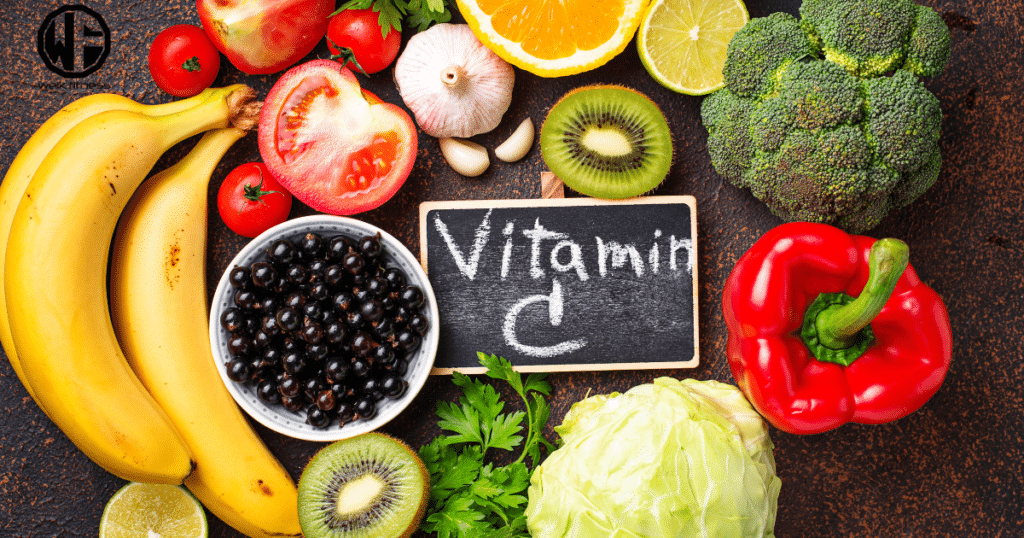The Power of Vitamin C for Effectively Enhancing Immunity
One supplement you have probably heard a time or two about is Vitamin C. This vitamin has been associated with immunity benefits for many years and is one of the most common supplements purchased when people get the sniffles. That said, there’s more to this key nutrient that many may not realize. Let’s take a deeper dive into this ingredient and learn a little more about how it can help boost your immunity.
Disclaimer: This article is for informational purposes only and is not meant to treat or diagnose any condition. It is recommended that you speak with your doctor before starting any exercise program, changing your daily nutrition, or adding any supplements to your regimen.
Table of contents

What is Vitamin C?
Vitamin C, also known as ascorbic acid, is an essential vitamin that supports our immunity system. It is a water-soluble vitamin that the human body cannot produce – hence, it must come from the foods we eat daily or through proper supplementation to fill in nutritional gaps.
How Can Vitamin C Help Boost Immunity?
Vitamin C is a vital micronutrient for the human body. This crucial vitamin is essential for enhancing immunity as it supports our cellular functions of both innate and adaptive systems of immunity.
Related Article: 8 Benefits and Uses of Maqui Berry to Enhance Your Health
This critical vitamin is a powerful antioxidant that helps strengthen our body’s immunity and creates a shield against many viruses and harmful pathogens.
Some studies have stated that vitamin C increases blood oxidant levels by around 30%. This helps our body to fight inflammation.
Where Can You Find It?

Vitamin C can be found in some of the food items we see on our plates every day. We mainly find this vitamin in vegetables and fruits. Since the human body cannot produce or store this vitamin, we need to consume food and take supplements to enhance immunity.
Related Article: The Benefits of Using Vitamin C Supplements
Below, we have made a list of foods that provide a significant amount of this vitamin and can help boost your immunity and defense.
1. Citrus Fruits
Citrus fruits such as oranges, lemons, or grapes have a considerable amount of Vitamin C in them. If you are looking for ideas and ways to help enhance immunity, start consuming citrus fruits on a daily basis.
2. Guava
Other than oranges and citrus fruits, guavas are full of this helpful vitamin as well. One single guava has as much as 126mg. It is also rich in the antioxidant lycopene.
There have also been studies showing that consuming guavas for a prolonged period can lower your blood pressure and cholesterol level.
3. Broccoli
Broccoli, one of the healthiest vegetables and known for being high in fiber, is also a great Vitamin C source. It helps in enhancing immunity and repairing damaged tissues. Therefore, it’s incredibly important to include broccoli in your diet to have a strong and healthy immune system.
4. Bell Peppers (Red and Yellow)
Bell peppers, mainly red and yellow ones, are extremely rich in antioxidants. It helps in maintaining a healthy heart and eye condition. They also have a good amount of vitamin C and can enhance collagen production. It is also known to help prevent various cancer.
5. Kakadu Plum
If you thought that oranges lead the race of foods high in vitamin C, then you’re going to be shocked. This Australian native food (Kakadu plum) has 10 times more vitamin C than oranges. It has more than 5000mg of vitamin C per 100g. Other than that, this superfood is rich in vitamin E, potassium, and the antioxidant lutein, which is excellent for eye health.
6. Thyme
Thyme is one of the richest foods in vitamin C. It has three times more vitamin C than oranges. If you are someone who is into herbs, then thyme is your ultimate source of vitamin C.

28g of fresh thyme contains 45mg of vitamin C. You can also sprinkle some thyme over your meal, and it can be a delicious meal loaded with vitamins to help boost immunity.
Thyme is also great for sore throats and other respiratory issues. So, if you want to help fight viruses and harmful pathogens, thyme should definitely be an herb to keep handy as it can be a great addition to your diet.
Vitamin C Supplements
Other than foods, vitamin C can also be consumed in the form of supplements. Vitamin C is an incredibly easy over-the-counter supplement to find, which can help fill in your nutritional gap. It should be said, you should always try to get as many of your micronutrients through whole food options as possible. Natural foods that have vitamin C will always be the best option, but you can take supplements if you are deficient in this vitamin.
Something else to consider is your activity level. Those who are physically active demand a higher intake of these key nutrients to keep their bodies performing optimally.
When is Best to Take Vitamin C Supplements?

Vitamin C supplements are a convenient way to ensure you’re meeting your daily intake of this essential nutrient. But when exactly should you take them for optimal effectiveness?
Vitamin C in the Morning vs. Evening
Morning: Taking vitamin C supplements in the morning can be a great way to kickstart your day. It provides a boost of energy and may help support mental clarity throughout the morning hours. Additionally, consuming this particular vitamin in the morning can help jumpstart your immune system, providing protection against common illnesses.
Evening: Alternatively, taking vitamin C supplements in the evening has its benefits. Overnight, the body undergoes repair and regeneration processes, and providing it with a dose of this powerful vitamin can support these functions. Additionally, supplementing with this vitamin may aid in skin repair and rejuvenation while you sleep, leading to healthier-looking skin over time.
Best to Take Vitamin C Supplements With or Without Food
With Food: It’s generally recommended to take vitamin C supplements with food. Consuming them alongside a meal can enhance absorption, particularly if the meal contains healthy fats. This is because this particular vitamin is fat-soluble, and pairing it with foods that contain fats can improve its bioavailability. Plus, taking it with food can help prevent potential stomach discomfort that some individuals may experience when taking it on an empty stomach.
Without Food: If you prefer to take your supplements separately from meals, that’s perfectly fine too. Vitamin C supplements can be taken on an empty stomach without any adverse effects. However, be mindful of potential stomach upset, especially if you have a sensitive stomach. In such cases, opting for a buffered form of the supplement or splitting your dosage throughout the day may be beneficial.
Consistency is Key with Vitamin C
Regardless of the time or manner in which you take vitamin C supplements, consistency is paramount. Incorporating them into your daily routine ensures a steady supply of this vital nutrient, supporting immune function, collagen production, and overall health in the long run.
Click here to continue reading…


*Disclosure: This article may contain affiliate links or ads, which means we earn a small commission at no extra cost to you if you make a purchase through these links. These commissions help support the operation and maintenance of our website, allowing us to continue producing free valuable content. Your support is genuinely appreciated, whether you choose to use our links or not. Thank you for being a part of our community and enjoying our content.
PLEASE CONSIDER SHARING THIS ON YOUR SOCIAL MEDIA TO HELP OTHERS LEARN MORE ABOUT THIS TOPIC.





